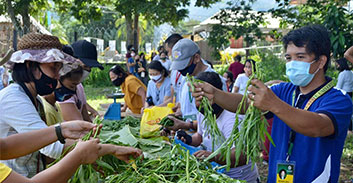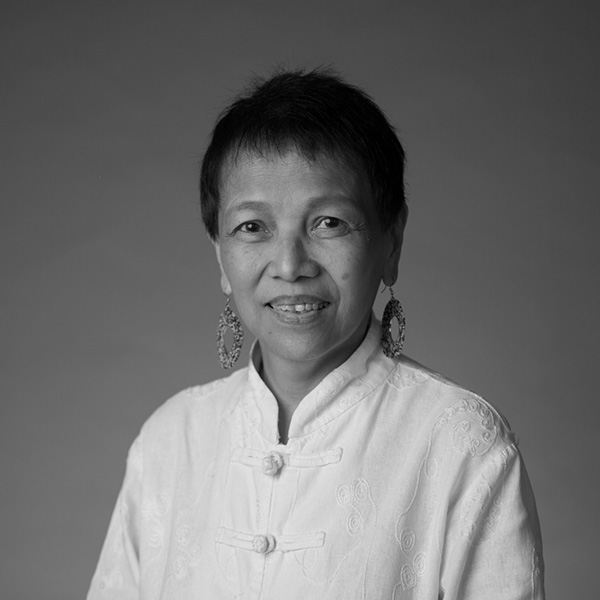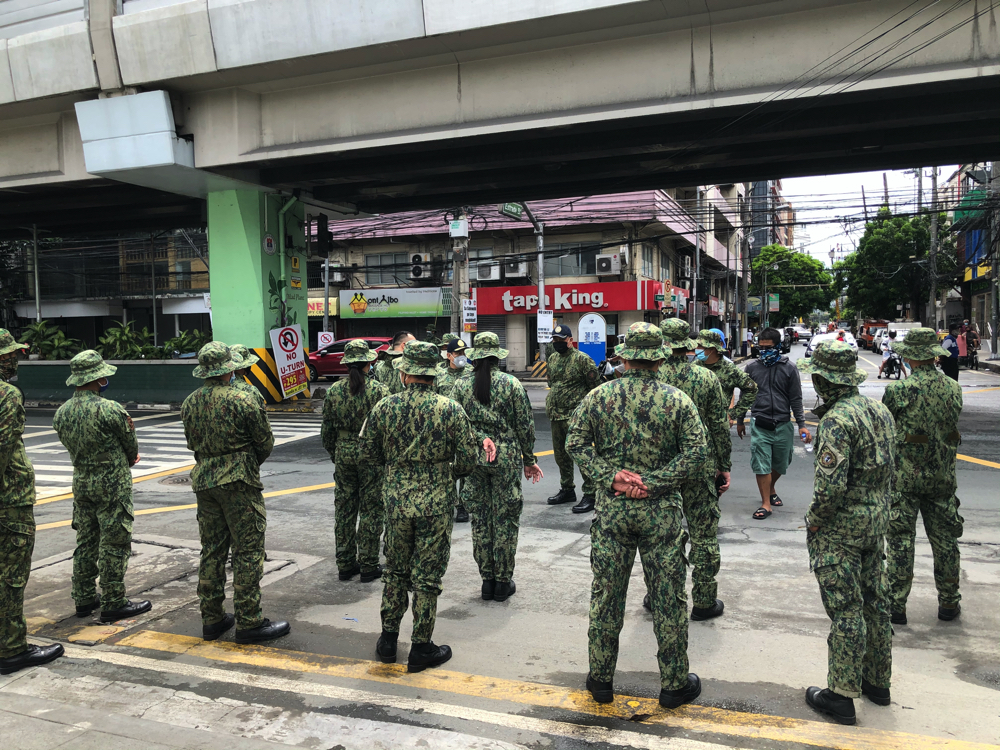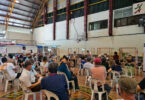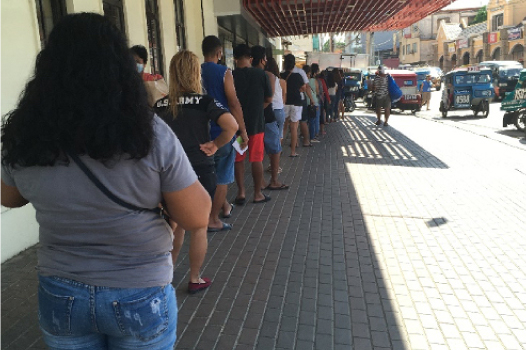The COVID-19 pandemic caught everyone by surprise and disrupted the day-to-day life of many Filipinos. The virus was first detected in China in December 2019, and then spread exponentially around the world. As of September 21, 2020, the Philippines recorded a total of 290,190 total cases with 54,958 active cases, 230,233 reported recoveries and 4,999 total number of deaths (DOH, 2020). With an increasing number of cases and local transmissions, the Philippine government has implemented different versions of community quarantines – enhanced, modified enhanced, general and modified general1. Each has different scopes of implementing strict rules of the mobility of people, goods and other basic essentials.
Following the directives of the national government, the provincial government of Leyte enforced a general community quarantine (GCQ). People were forced to stay at home and work from there, curfews were implemented, and returning residents (i.e. Overseas Filipino Workers (OFWs) and locally stranded individuals (LSI)) have had to follow quarantine protocols (CNN Philippines, 2020). In effect, the closure of municipal borders in provinces limited the movement of people, goods and services. For example, late in March 2020, Ormoc City, one of the cities on the northeast of the island of Leyte, where this article was written, closed its borders (ABS-CBN News, 2020). Since this city is the vegetable bowl of Leyte (DA-ATI, 2016), it poses a threat to the vegetable supply of other municipalities.
This article focuses on the experiences and response of Visayas State University (VSU). Located in Baybay City and 34 km south from Ormoc City, VSU launched “#OplanTanom” (direct translation: Operational Plan Planting) on April 30, 2020. This project has aimed to intensify vegetable production to mitigate disruption in the supply chain brought about by COVID-19 pandemic (VSU, 2020). Vegetable production is done inside the VSU campus2. The project plans to grow at least 10 different vegetables and these will be given freely to the VSU community and its neighbouring barangays. Anyone working at the university and any representative from neighbouring barangays wanting to avail themselves of fresh vegetables can queue on the scheduled harvest per week for distribution. So far it has distributed at least five tons of assorted vegetables to more than 3,000 beneficiaries. The free distribution of vegetables started in April 2020 and is an activity that continues at present. This is a reflection of the spirit of “bayanihan,” a Filipino term for civic unity, cooperation and helping each other. This VSU project intends to distribute free vegetables until December 2020. One of the aims of this is also to encourage Filipinos to eat more vegetables to boost their immune systems (McDougall et al., 2019). In addition, vegetable seedlings are also provided to those who want to grow their own vegetable gardens.
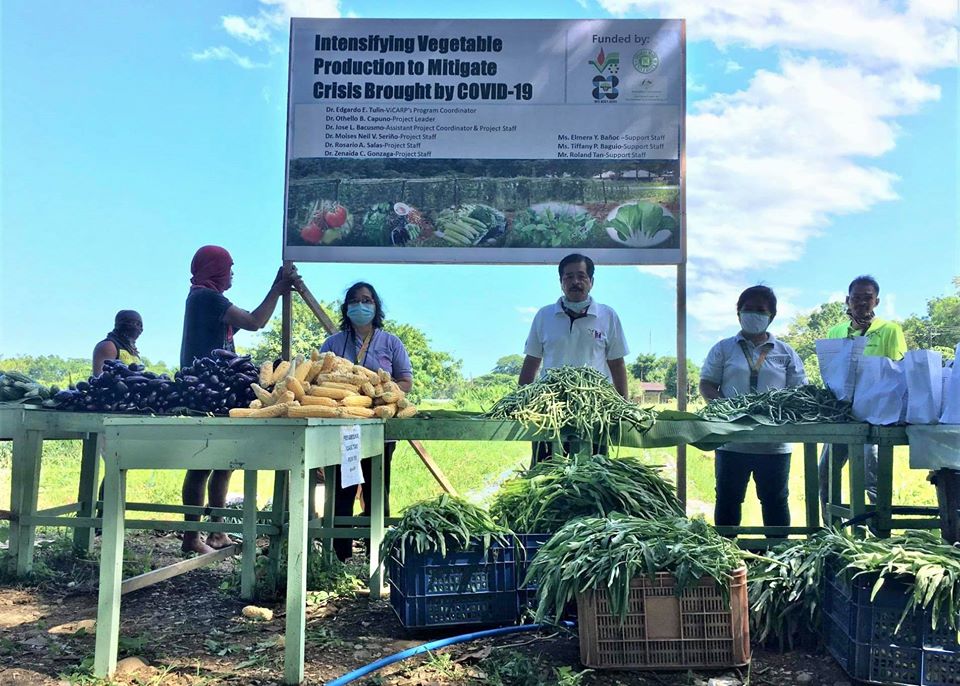
The project proponents with the VSU Vice President for Research and Extension with fresh harvest of assorted vegetables ready for distribution. Source: VSU official website at www.vsu.edu.ph
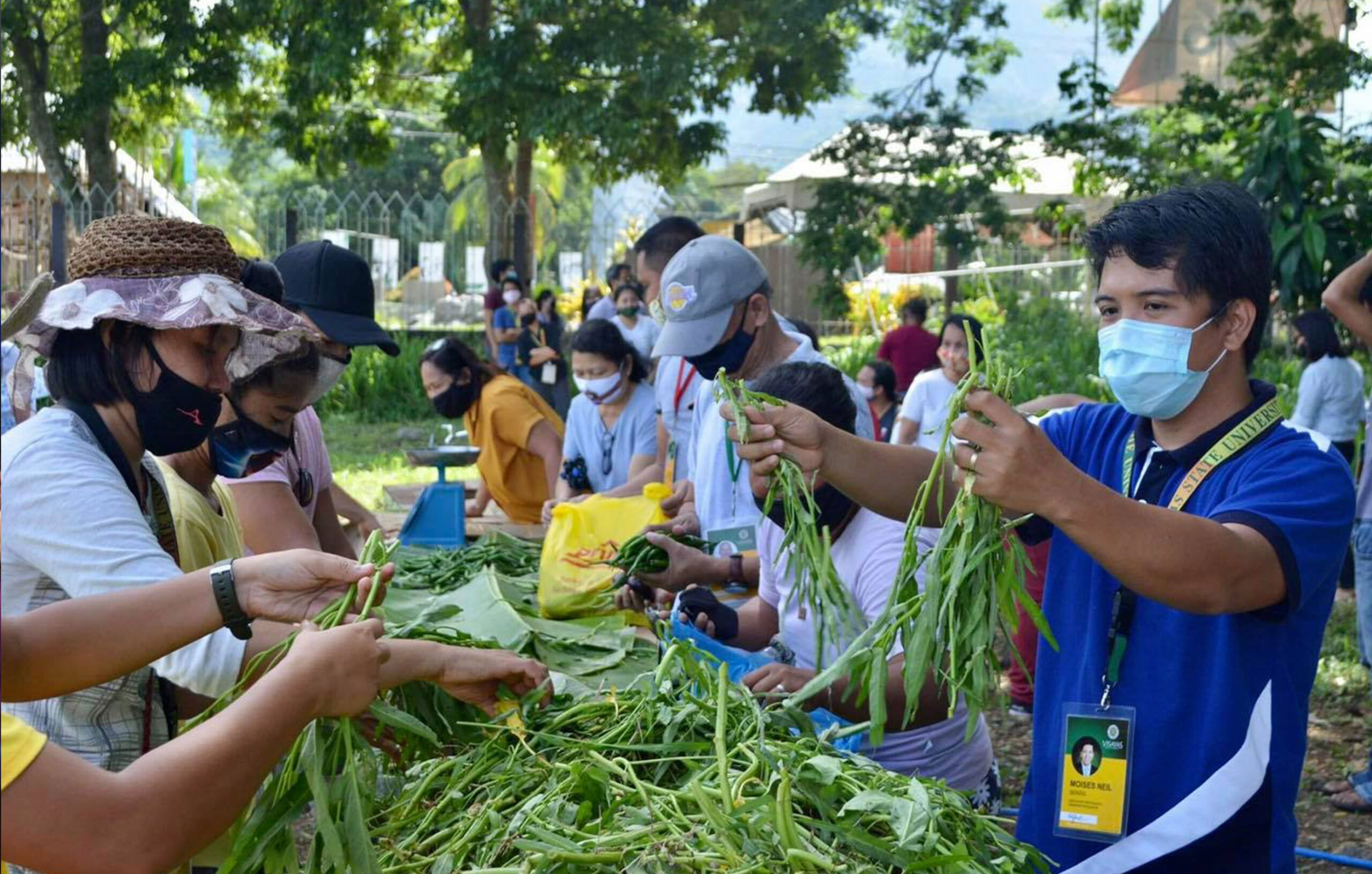
Sorting of vegetables before distribution to the VSU community and neigbouring barangays. Source: VSU official website at www.vsu.edu.ph
Furthermore, the university has also adopted flexible working arrangements for its faculty and staff to help prevent the spread of COVID-19 in the vicinity. Employees can choose to work-from-home, or report for less than five days per week to the office. The Visayas Socio-Economic Research and Data Analytics Center (ViSERDAC) spearheaded a quick survey to assess how this COVID-19 pandemic has affected the university’s constituents – faculty and staff – and how they are coping with its consequences. An online survey was conducted last May 18-23, 2020 and during the survey, classes were already suspended and students were not physically on the campus3. A total of 133 respondents participated in the online survey. The survey also aimed to assess the coping mechanisms of VSU faculty and staff amidst the pandemic. This provides a general picture of how working men and women in a state university have handled the situation to stay mentally sound amidst the stress brought by the pandemic. This is because the closures of schools, home quarantine and implementation of physical distancing have caused considerable anxiety and stress even among teachers (Talidong and Toquero, 2020).
Results of our study revealed that VSU faculty and staff experienced an average stress score of 8, (i.e. score of “0” means no stress and “16” means highest stress score). We asked respondents how they were coping with the stress, anxiety and restrictions in movement and disruptions in usual work routines. The respondents identified several activities that helped them cope during the pandemic. The top ranking coping mechanism for both men and women were doing household chores. This was followed by having increased social media usage, praying more and spending time with their families. The home quarantine was an opportunity for families to spend more time bonding and reconnecting with each other.
Interestingly, pets are also considered as one of the important companions during this time of pandemic after family members. Most men tended to do physical exercises (e.g., lifting weights, cardio-exercises, among others), while most women became more engaged in gardening. These observations in a state university resonate in other rural areas in the Philippines, where people are rediscovering household chores, family time and gardening. These findings reflect what Chew et al. (2020) have reported where people tend to use a wide range of coping strategies to deal with the negative psychological outcomes associated with a health crisis.
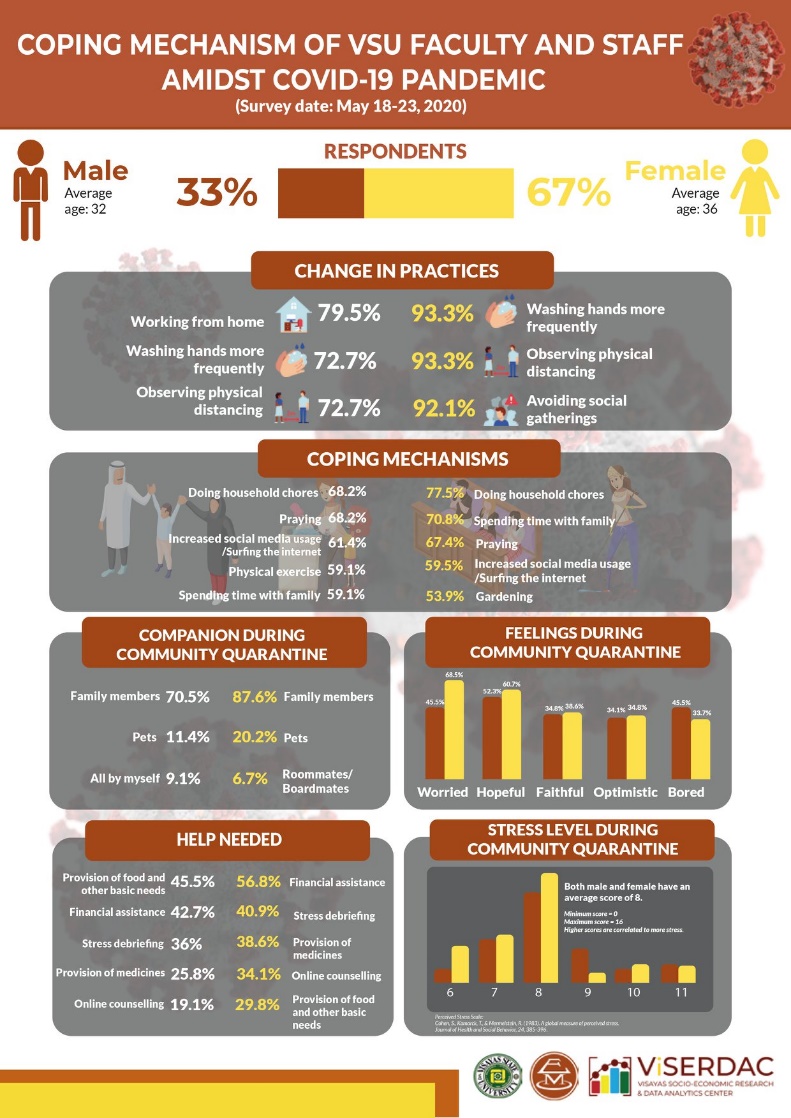
Coping mechanism of VSU faculty and staff amidst COVID-19 pandemic.
In terms of emotional states, women have reported to be more worried about the current situation while men indicated that they are bored during the lockdown or community quarantine. In addition, both men and women said that they need stress debriefing. Stress debriefing refers to an activity that assists people who are generally exposed to stressful or traumatic events. In response, VSU through its university guidance councilors provided psychosocial support, especially to faculty and staff who are undergoing strict quarantine such as those LSIs or returnees from abroad, through the program called “Online Kumustahan4” via Google meet. Self-assessment surveys are also sent to each faculty and staff to determine those strengths that helped them cope with the pandemic. Since face-to-face counseling is not feasible during the pandemic, processing and addressing of responses was done through a segment in the university radio station, VSU Radio DYDC FM.
Moreover, the pandemic gave rise to working women doing more gardening. With panic buying resulting to long queues in markets, gardening helped them grow their own food and cope with the stress associated with the pandemic. People are now sharing photos on social media sites of their mini backyard farms and of their grown plants. Aside from vegetables, they are also planting ornamental plants, cacti and succulents for home decorations. There is an increase demand for seeds, seedlings, pots and garden soil. Many are queuing for free seedlings during the distribution of free vegetables of #OplanTanom in VSU. The purchasing and selling of pots and containers for their garden plants were also common. With more people engaging in agriculture during this pandemic, this could explain the growth increase of the agriculture, forestry and fishery sectors by 1.6% despite an overall decline in the Philippine Gross Domestic Product (GDP) by 16.5% in the second quarter of 2020 due to the pandemic (PSA, 2020).
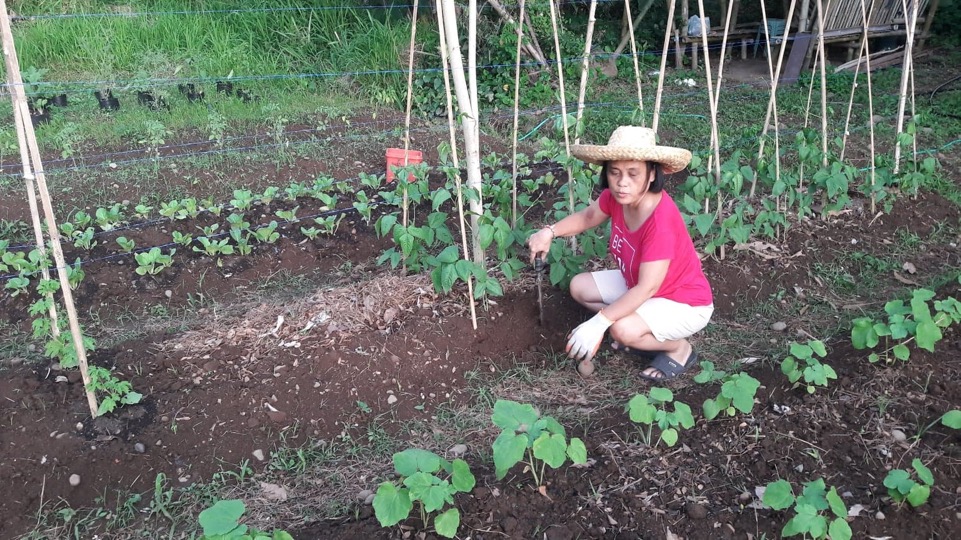
VSU Vice President for Academic Affairs gardening in her small backyard farm. Source: VSU official website at www.vsu.edu.ph
At VSU, the faculty and staff have experienced varying conditions during the time of the pandemic. Others have stayed with their families, some resided alone and some have been working from their homes, especially those who have comorbidities. Under these conditions, people have coped in different ways. This pandemic has caused unprecedented disruption to life especially among working adults in the rural Philippines. As such, there is a need to identify whose well-being is more affected and who were able to cope better. The COVID-19 pandemic is an urgent economic and health crisis. The VSU experience has shown us that working adults need to be encouraged to employ multiple coping strategies and engaged themselves more in physical activities to cope better. Doing so will improve physical and mental health, allowing them to stay mentally sound and proactive during this ongoing health crisis.
1 October, 2020
References
- ABS-CBN News. 2020. Ormoc closes borders, won’t take respiratory disease patients from outside city amid COVID-19 crisis. https://news.abs-cbn.com/news/03/24/20/ormoc-closes-borders-wont-take-respiratory-disease-patients-from-outside-city-amid-covid-19-crisis. (Accessed 17 August, 2020).
- Chew, Q. H., Wei, K. C., Vasoo, S., Chua, H. C., & Sim, K. 2020. Narrative synthesis of psychological and coping responses towards emerging infectious disease outbreaks in the general population: practical considerations for the COVID-19 pandemic. Singapore Medical Journal. doi.org/10.11622/smedj.2020046
- CNN Philippines. 2020. More provinces, cities extend enhanced community quarantine until April 30. Metro Manila: CNN Philippines. https://cnnphilippines.com/regional/2020/4/8/other-provinces-extend-lockdown-to-April-30-after-Luzon-announcement.html. Accessed 22 April, 2020).
- Department of Agriculture – Agricultural Training Institute (DA-ATI). 2016. Rebuilding efforts continue for CALCOA. https://ati.da.gov.ph/rtc8/category/ati-rtc-8-vocabulary/eastern-visayas/leyte/ormoc-city. (Accessed 17 August, 2020).
- Department of Heath (DOH). 2020. COVID-19 Case Tracker Philippines. https://www.doh.gov.ph/2019-nCov. (Accessed 22 September, 2020).
- Inquirer.net. 2020. List: What consitute ECQ, GCQ, and ‘modified’ ECQ áreas?. https://newsinfo.inquirer.net/1273571/fwd-list-difference-between-ecq-modified-ecq-gcq. (Accessed 17 September, 2020)
- McDougall, S., Gonzaga, Z., Rodgers, G., Adam, G., Borines, L., Gerona, R., Seriño, M.N.V., Labonite, M., Gonzaga, N., Justo, V., Carusos, E., Lonzaga, E., Acosta, R., Tesoriero, L.,Singh, S.P., & Kernot, I.. 2019. Integrated Crop Management (ICM) to Enhance Vegetable Profitability and Food Security in the Southern Philippines and Australia. Australian Centre for International Agricultural Research (ACIAR), Canberra ACT 2601, Australia.
- Philippine Statistics Authority (PSA). 2020. GDP growth rate drops by 16.5 percent in the second quarter of 2020; the lowest starting 1981 series. http://www.psa.gov.ph/national-accounts. (Accessed 17 August, 2020)
- Talidong, K. J. B., & Toquero, C. M. D. 2020. Philippine teachers’ practices to deal with anxiety amid COVID-19. Journal of Loss and Trauma, 1-7. doi.org/10.1080/15325024.2020.1759225
- Visayas State University (VSU). 2020. To mitigate disruption of food supply, VSU launches #OplanTanum. https://www.vsu.edu.ph/articles/news/1813-to-mitigate-disruption-of-food-supply-vsu-launches-oplan-tanum. (Accessed 17 August, 2020)
Therese C. Ratilla is the science research assistant of the Visayas Socio-Economic Research and Data Analytics Center (ViSERDAC), College of Management and Economics, Visayas State University. She finished Bachelor of Science in Economics and serves as the editorial assistant of the Review of Socio-Economic Research and Development Studies (ReSERDS).
Moises Neil V. Seriño is the dean of the College of Management and Economics. He finished his doctorate in economics from Göttingen University, Germany and he was a visiting research fellow at the Center for Southeast Asian Studies, Kyoto University. His research interests include development economics, agricultural economics and sustainable development.
- 1 The Philippines initiated different quarantine regulations. 1. An Enhanced Community Quarantine (ECQ) permitting no movement regardless of age and health status; minimal economic activity and no transports services unless essential sector; 2. A Modified ECQ – limited movement to work and services; only 50% workforce allowed; limited transport services for essential goods and people to go to work; no physical classes; 3. A General Community Quarantine (GCQ) – limited movement to work and services; only 75% workforce allowed; limited transport services with social distancing; no face-to-face learning; 4. A modified GCQ where socio-economic activities are allowed as long as minimum public health standards are taken into account.
- 2 VSU has a land area of 1,099.4 ha – largest portion of which comprises 574.2 ha of forest reserves. VSU is an agricultural university and has available land for crop plantations usually used for the conduct of field experiments. Maximum potential production land area is 104.3 ha.
- 3 The university houses student dormitories within the campus. Around 1,800 of the total 6078 students reside within the student dormitories. However, around 400 students were stranded on VSU campus from April to May 2020.
- 4 Kumustahan direct translation means to talk to someone and ask someone how they are doing.
Citation
Therese C. Ratilla and Moises Neil V. Seriño. 2020. “Coping in this Time of the COVID-19 Pandemic: The Case of a State University in Leyte Island, Philippines” CSEAS NEWSLETTER, 78: TBC.

